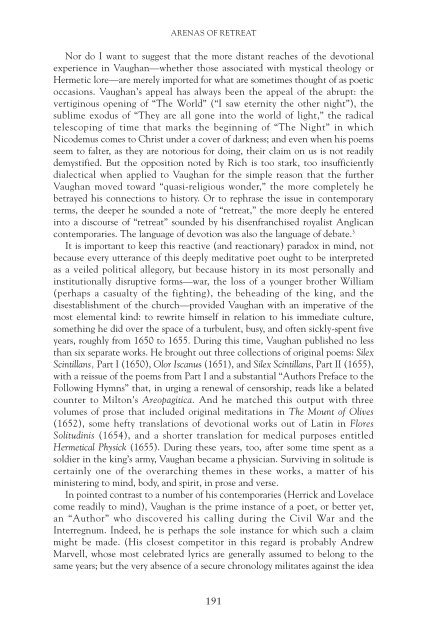ENG LYRIC POETRY.pdf - STIBA Malang
ENG LYRIC POETRY.pdf - STIBA Malang
ENG LYRIC POETRY.pdf - STIBA Malang
You also want an ePaper? Increase the reach of your titles
YUMPU automatically turns print PDFs into web optimized ePapers that Google loves.
ARENAS OF RETREAT<br />
Nor do I want to suggest that the more distant reaches of the devotional<br />
experience in Vaughan—whether those associated with mystical theology or<br />
Hermetic lore—are merely imported for what are sometimes thought of as poetic<br />
occasions. Vaughan’s appeal has always been the appeal of the abrupt: the<br />
vertiginous opening of “The World” (“I saw eternity the other night”), the<br />
sublime exodus of “They are all gone into the world of light,” the radical<br />
telescoping of time that marks the beginning of “The Night” in which<br />
Nicodemus comes to Christ under a cover of darkness; and even when his poems<br />
seem to falter, as they are notorious for doing, their claim on us is not readily<br />
demystified. But the opposition noted by Rich is too stark, too insufficiently<br />
dialectical when applied to Vaughan for the simple reason that the further<br />
Vaughan moved toward “quasi-religious wonder,” the more completely he<br />
betrayed his connections to history. Or to rephrase the issue in contemporary<br />
terms, the deeper he sounded a note of “retreat,” the more deeply he entered<br />
into a discourse of “retreat” sounded by his disenfranchised royalist Anglican<br />
contemporaries. The language of devotion was also the language of debate. 3<br />
It is important to keep this reactive (and reactionary) paradox in mind, not<br />
because every utterance of this deeply meditative poet ought to be interpreted<br />
as a veiled political allegory, but because history in its most personally and<br />
institutionally disruptive forms—war, the loss of a younger brother William<br />
(perhaps a casualty of the fighting), the beheading of the king, and the<br />
disestablishment of the church—provided Vaughan with an imperative of the<br />
most elemental kind: to rewrite himself in relation to his immediate culture,<br />
something he did over the space of a turbulent, busy, and often sickly-spent five<br />
years, roughly from 1650 to 1655. During this time, Vaughan published no less<br />
than six separate works. He brought out three collections of original poems: Silex<br />
Scintillans, Part I (1650), Olor Iscanus (1651), and Silex Scintillans, Part II (1655),<br />
with a reissue of the poems from Part I and a substantial “Authors Preface to the<br />
Following Hymns” that, in urging a renewal of censorship, reads like a belated<br />
counter to Milton’s Areopagitica. And he matched this output with three<br />
volumes of prose that included original meditations in The Mount of Olives<br />
(1652), some hefty translations of devotional works out of Latin in Flores<br />
Solitudinis (1654), and a shorter translation for medical purposes entitled<br />
Hermetical Physick (1655). During these years, too, after some time spent as a<br />
soldier in the king’s army, Vaughan became a physician. Surviving in solitude is<br />
certainly one of the overarching themes in these works, a matter of his<br />
ministering to mind, body, and spirit, in prose and verse.<br />
In pointed contrast to a number of his contemporaries (Herrick and Lovelace<br />
come readily to mind), Vaughan is the prime instance of a poet, or better yet,<br />
an “Author” who discovered his calling during the Civil War and the<br />
Interregnum. Indeed, he is perhaps the sole instance for which such a claim<br />
might be made. (His closest competitor in this regard is probably Andrew<br />
Marvell, whose most celebrated lyrics are generally assumed to belong to the<br />
same years; but the very absence of a secure chronology militates against the idea<br />
191










